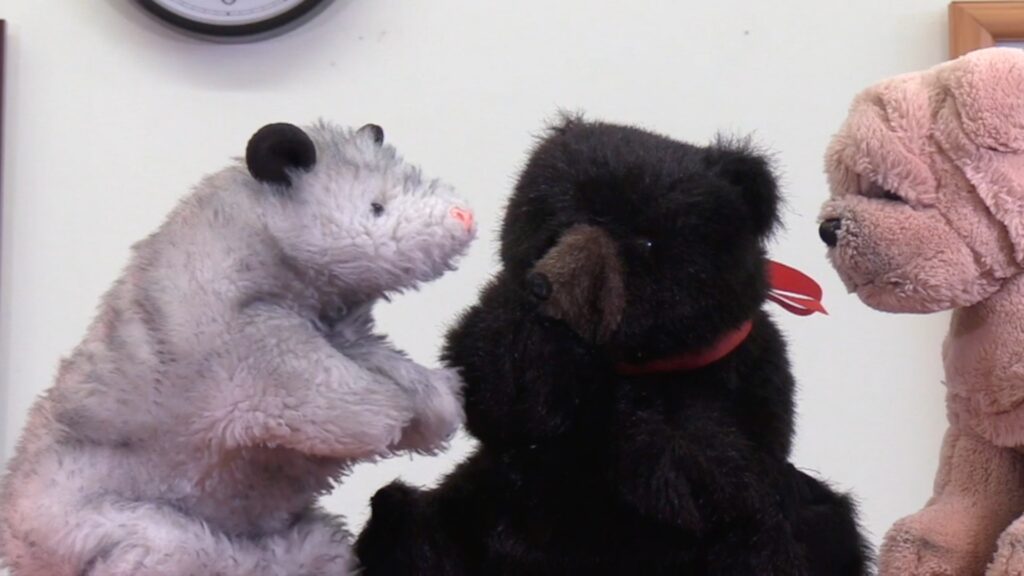The final installment of the “Possum Feel Stressed” series of videos:
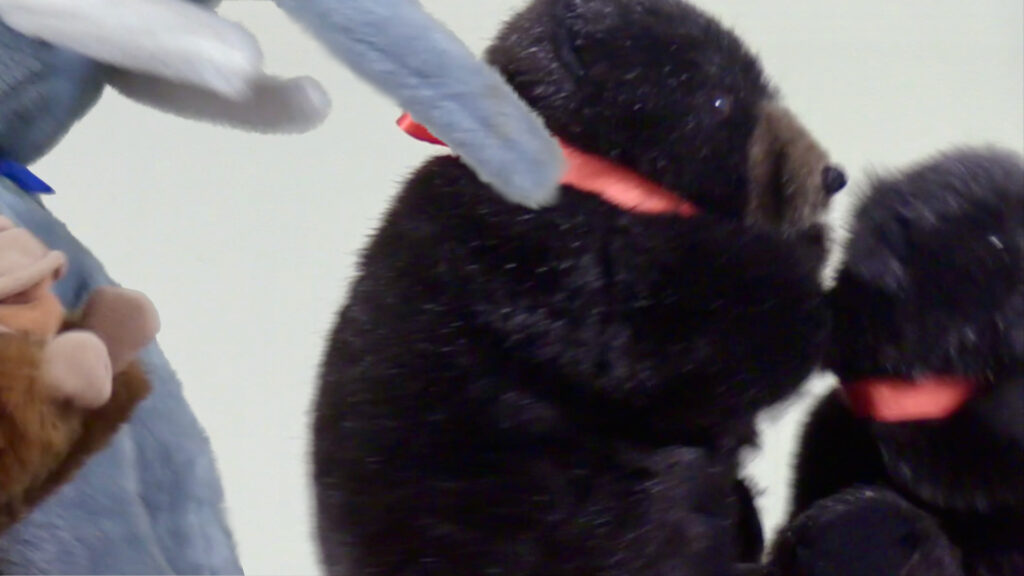
As usual, full script is below….
Continue reading “Possum feels stressed, conclusion”Yet Another Unitarian Universalist
A postmodern heretic's spiritual journey
The final installment of the “Possum Feel Stressed” series of videos:

As usual, full script is below….
Continue reading “Possum feels stressed, conclusion”Lecture for an online class at the Unitarian Universalist Church of Palo Alto.
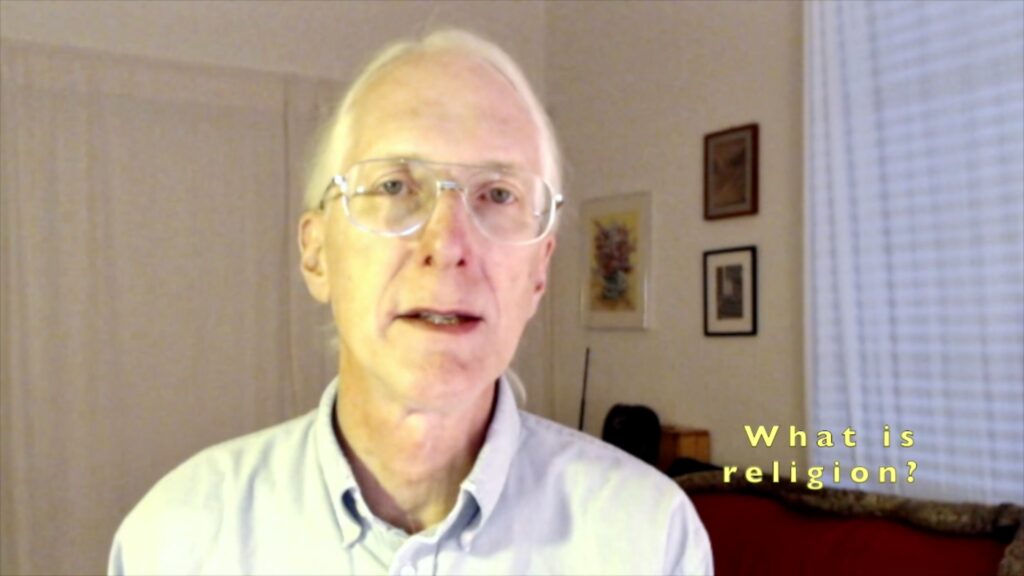
The full text of the lecture is below the fold.
Continue reading “What is religion?”The fourth installment in this video series:

Full text of the script is below….
Continue reading “Possum is working on reducing his stress”The past couple of weeks have been a wild ride for me.
At work, this is always the busiest time of year because we’re getting ready for a new school year. This year is busier than usual because so many things have to be moved online. Fortunately, we were able to delay the start of Sunday school classes till after Labor Day, but even with that there’s a lot to be done.
The weather has been crazy. We had thunderstorms last week that lit wildfires all around us, and now just about the whole state of California is covered in a big smoke cloud. There are fires burning to our south — they’ve closed Highway 1 south of Half Moon Bay down to Santa Cruz because of the fires — and fires burning to our east, and fires burning to our north. There’s smoke everywhere. At its worst, the AQI peaked at over 400 in our area, then we had a couple of clear days, and now the AQI is up to about 150. Here’s a recent screenshot of fire.airnow.gov. Density of smoke plumes is indicated by the darkness of the gray overlays; the little squares and circles are AQI monitors, with green being healthy, yellow moderate, orange unhealthy, and purple hazardous; then the little flame icons show locations of fires, and the little glowing dots are potential fires from satellite imagery:
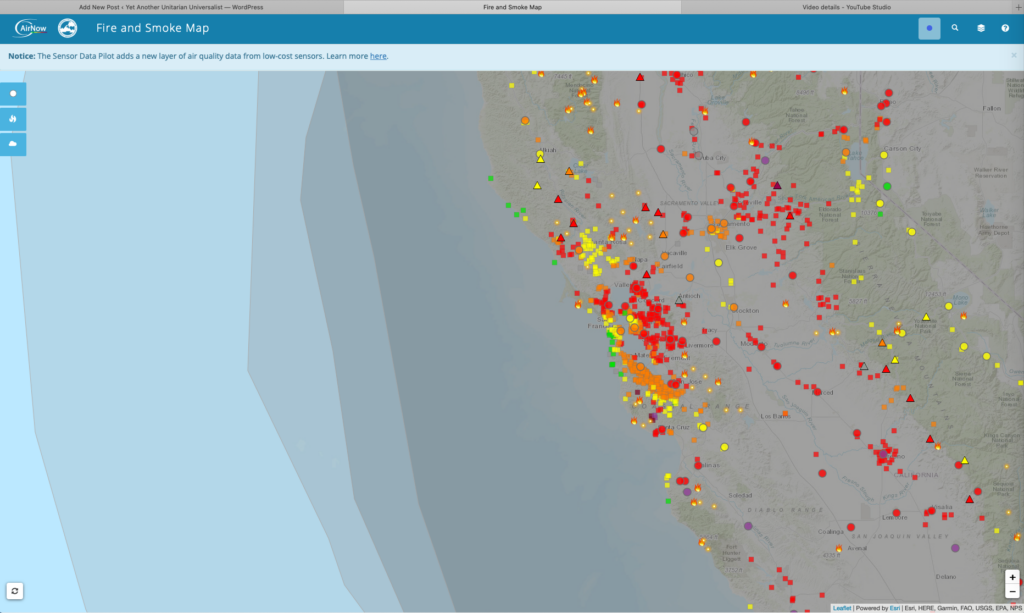
And now we have a Red Flag Warning — a warning for high danger of potential fires — because of a forecast of the possibility of more dry lightning over the next four days. Someone recently asked what a Red Flag Warning means. For me, it means: double-check your go-bag, then place it by the front door because you may only get 30 minutes warning to evacuate. Ah yes; the joys of living in a world dominated by global climate change.
Then if that’s not enough, I’ve been sitting too long at the computer — because, of course, when you work at home you have to spend hours and hours sitting in front of your computer — and my foot muscles got all cramped up; so much so that it’s actually painful to walk. I didn’t even know that could happen to my feet.
Pandemic, wildfires, and job. It would be easy to get discouraged, but I look at it this way — at least I get to work indoors.
Before we went to bed Saturday night, we saw a couple of flashes of distant thunder. The National Weather Service had said that moist air from a tropical storm to the south was being driven up the Pacific coast by a big, hot high pressure system parked over the southwest, and they had predicted the possibility of thunder and lightning. Since this is the Bay Area, where we hardly ever get thunder and lightning, and what we do get is inconsequential, we thought that was the end of it.
We were awakened at half pst three by lightning flashes and loud thunder and wild wind and — could it be? — the sound of rain. It never rains in the Bay Area in August, but this sounded like real rain. Then the power went out. We got up, and went around closing windows. I stood out on the back steps for a moment, just so I could feel some raindrops.
The power was still out when we awoke on Sunday morning. That meant the huge cemetery gate that closes every evening wouldn’t open. I had to open it so I could drive to work. The hand crank was missing, meaning I was stuck inside until the cemetery staff showed up. And of course it started raining again while I was out there.
Since then, it’s been muggy — by Bay Area standards, muggy means relative humidity of about 60% — and partly cloudy — we hardly ever get real clouds in August, just high fog. It feels like the New England summer days I’m used to. It’s very pleasant. I just wish we’d get another thunderstorm, but I know that’s too much to ask.
In the third installment of the Possum Feels Stressed video series, Possum learns about prayer as a spiritual practice (even though he doesn’t believe in God):
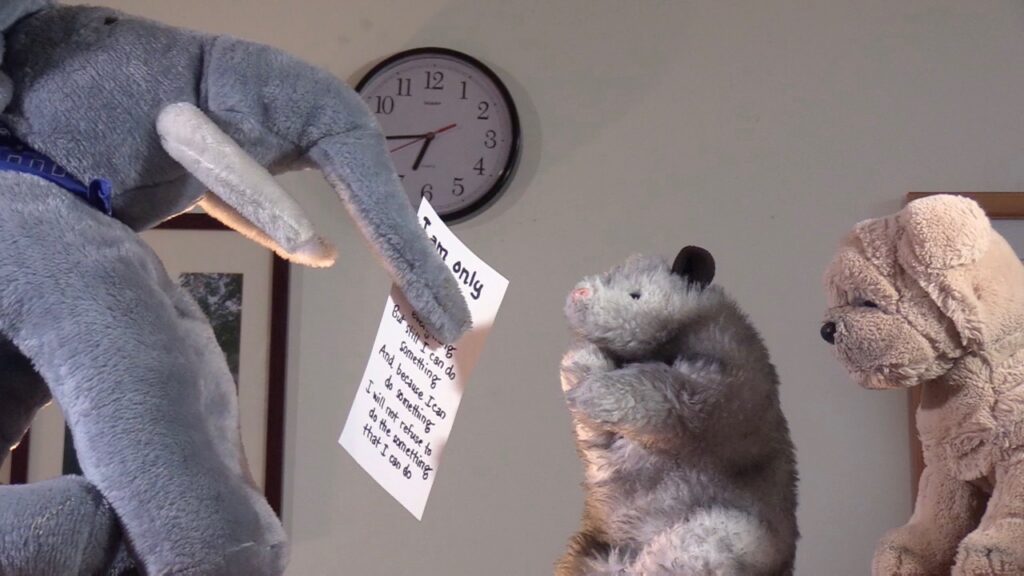
The first poem mentioned in the video is by Edward Everett Hale, a Unitarian minister:
I am only one.
But still I am one.
I cannot do everything.
But still I can do something.
And because I cannot do everything
I will not refuse to do the something that I can do.
The second poem mentioned in the video is by Universalist poet Edwin Markham:
Outwitted
They drew a circle that shut me out —
Heretic, rebel, a thing to flout.
But Love and I had the wit to win:
We drew a circle that took them in.
Full script for the video is below….
Continue reading “Possum is still stressed…”This is the only sermon I’ve been able to find that was preached at the Unitarian Church of Palo Alto, which existed from 1905 to 1934. It’s a sermon preached at the dedication of the new building of the Unitarian Church of Palo Alto, March 24, 1907. It was doubtless revised for publication, and then was printed in the Christian Register (later called the Unitarian Register) on April 25, 1907, pp. 465-466.
George Stone, who preached this sermon, was the first minister the Unitarian Church of Palo Alto ever had. He was actually the American Unitarian Association’s Field Secretary for the West coast, and part of his duties were planting new Unitarian churches; since Palo Alto was a college town, it was seen as a likely spot for a Unitarian congregation, and that’s doubtless why Stone went ot Palo Alto in 1905. He worked with the new Palo Alto congregation for about a year, until 1906, when they called their first settled minister, Sydney B. Snow. Evidence in the extant documents of the Unitarian Church of Palo Alto show that they considered him their minister, even though he wasn’t a called minister. And in 1907, he returned to Palo Alto to preach the dedicatory sermon when their new building was complete.
But this sermon is of more than historical interest. True, we might not agree with some of the theology, and certainly the gender-specific language (e.g., “man” for “humankind,” male pronouns for the deity, etc.) now sounds dated. But Stone argues for the continual progress of organized religion; looking back at old forms of American religion, Stone says that our spiritual forebears “were passing through a stage of evolution which to us seems a sad one.” And he acknowledges that some day, he, too, will seem outdated: “Who knows but our descendants will look back upon the record of our lives with equal pity and tenderness?” Yet Stone has some powerful things to say about the purpose of public worship. A Unitarian congregation, says Stone, “stands for the solidarity of the race rather than for the single individual” — and yet, all these years later, we Unitarian Universalists are still overly individualistic, and reading Stone’s sermon might help us realize how far we have yet to go in our religious development.
“Public Worship” by Rev. George W. Stone
The mission of Unitarianism is to help mankind to a higher and more spiritual faith than it has had before; for Unitarianism is not a theology and a philosophy only, it is a life. It is, least of all, a negation or a denial of some other religion. It is a comprehensive religion, including the good in the older religions. No man is ready to become a Unitarian until he is able to do his own thinking. In order to be a Unitarian he may outgrow the old theologies, but he must not outgrow religion. Until he learns to use his freedom wisely, and not make it simply a license to reject everything he cannot understand, until then, he may not be orthodox, but he is not necessarily a Unitarian, for Unitarianism is a positive faith. It believes that love is the only divine power in the universe, and that at last all mankind will grow into it, that the process of man’s development from the animal, through the human, into the spiritual, is now going on, that it will one day be completed.
Continue reading “A 1907 Unitarian sermon from Palo Alto”The second video in the Possum Feels Stressed series. Mindfulness meditation didn’t work out as a stress-reliever for Possum, and in this episode he and his friend Nanas the monkey try yoga…
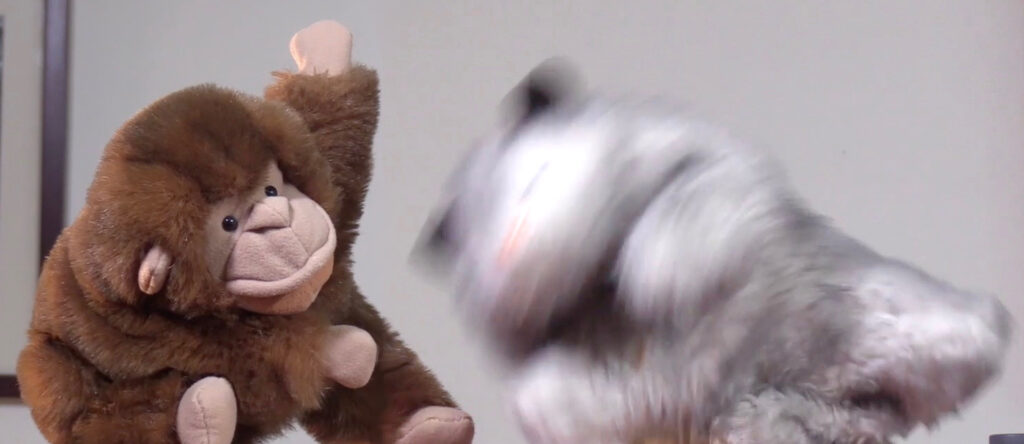
The script is below, for those who like that sort of thing. Be warned, it got changed a bit in performance and editing.
Continue reading “Possum feels stressed, part two”Alice Locke Park, pacifist and early feminist, was a member of the Unitarian Church of Palo Alto from 1907 to 1920. Alice resigned from the church in 1920 in protest of the way some people in the church supported the the First World War; she was probably referring to people like Rev. Bradley Gilman and George Fullerton Evans, both of them saber-rattlers who spouted pro-war “propaganda” (in the words of another pacifist in that congregation). She later joined the Quakers. But she was a Unitarian for 13 years, and some of her writings seem to me to encapsulate a very contemporary Unitarian Universalist worldview—like this statement:
My religion is humanity—humanitarianism—confident that the present time is all that we are sure of, and [that] our duty, our progress and our usefulness are all here and now—If we think earnestly of the present and try to do all we can right here and now—we are at least sure of immediate results. My religion is boundless—Nothing human is alien to me. [quoted in Eunice Eichelberger, “‘Hearts Brimming with Patriotism,’” ed. Robert W. Cherny, California Women and Politics: From the Gold Rush to the Great Depression, Univ. Neb. Press, 2011, pp. 321-332.]
I think this would make a good responsive reading, if you arranged it something like this:
My religion is humanity—humanitarianism—
Confident that the present time is all that we are sure of, and that our duty, our progress, and our usefulness are all here and now—
If we think earnestly of the present and try to do all we can right here and now, we are at least sure of immediate results.
My religion is boundless—Nothing human is alien to me.
Not that this is some final definition of religion, some kind of dogma. By the end of his life, my father had become such a strong environmentalist that he refused to call himself a humanist any more, and I can imagine his criticisms of this reading. Nevertheless, the call to action and the appeal to a wide humanitarianism should be pleasing (if not definitive) to most.
The first installment in the Possum series of videos:
